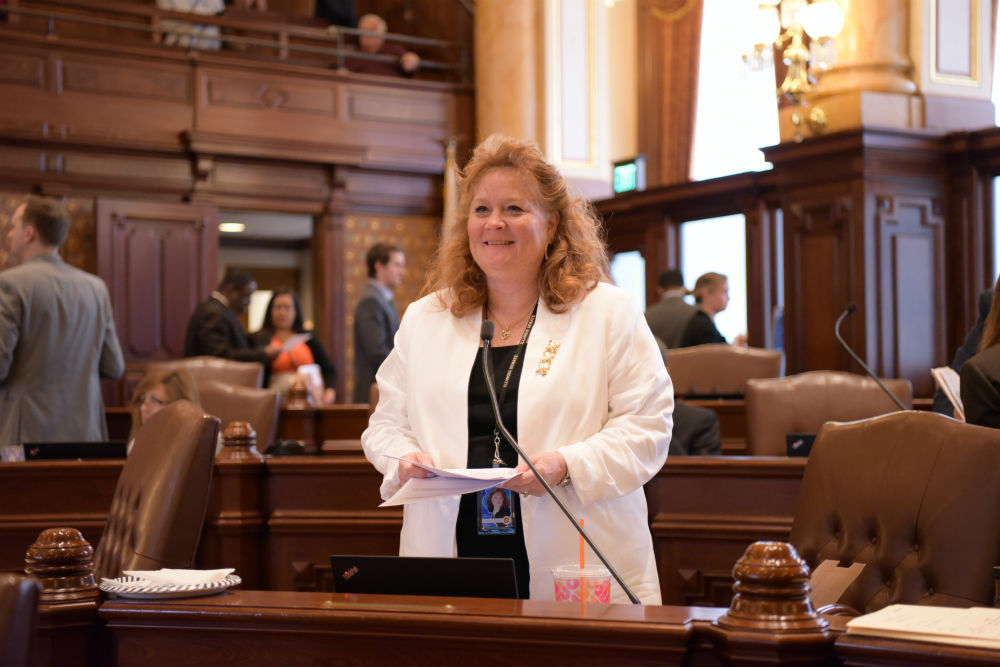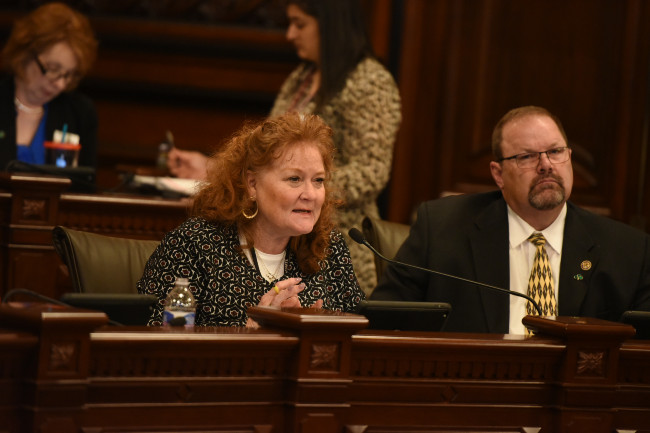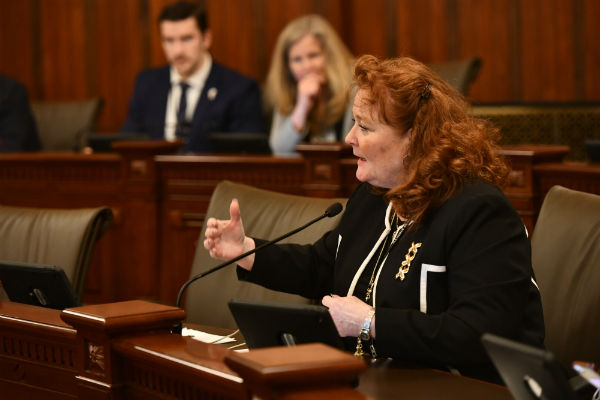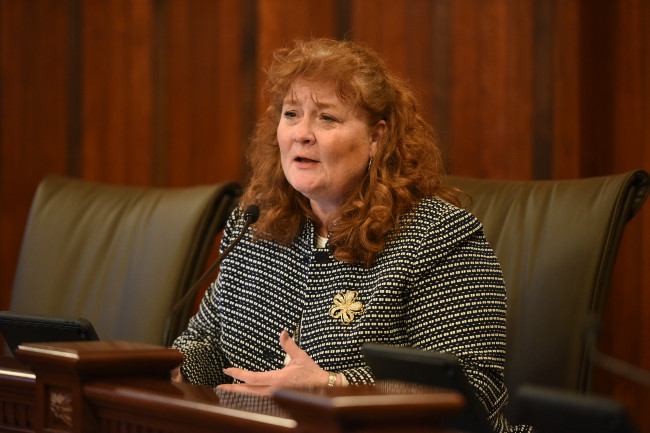- Details
 DES PLAINES – As unemployment claims begin to level off and the economy reopens, State Senator Laura Murphy (D-Des Plaines) urges Illinoisans to take advantage of free credit reporting websites to assess their financial situation.
DES PLAINES – As unemployment claims begin to level off and the economy reopens, State Senator Laura Murphy (D-Des Plaines) urges Illinoisans to take advantage of free credit reporting websites to assess their financial situation.
“We’re starting to see things open up and people go back to work, but we aren’t out of the woods yet. The pandemic may have long-term economic consequences for some families,” said Murphy. “These free resources can help you get back on track.”
Federal law requires each of the three nationwide consumer credit reporting companies—Equifax, Experian and TransUnion—to provide a free credit report every 12 months if requested. As a result of the COVID-19 pandemic, these companies are offering free online weekly credit reports through April 2021.
The information in these reports may affect mortgage rates, credit card approvals, apartment requests and job applications. Reviewing credit reports can also help catch signs of identity theft early.
“COVID-19 may have delayed some of your financial goals, but you shouldn’t let it derail them completely,” said Murphy. “Credit reports are just one more tool to help you toward a full recovery.”
To find out more about why credit is important or to request a credit report, visit www.AnnualCreditReport.com.
- Details
 DES PLAINES – To help local businesses recover from pandemic-related closures, State Senator Laura Murphy (D-Des Plaines) invites business owners to apply for assistance through the new Business Interruption Grant program, which will make $60 million available for 3,500 small businesses affected by the ongoing COVID-19 pandemic in the first round of funding.
DES PLAINES – To help local businesses recover from pandemic-related closures, State Senator Laura Murphy (D-Des Plaines) invites business owners to apply for assistance through the new Business Interruption Grant program, which will make $60 million available for 3,500 small businesses affected by the ongoing COVID-19 pandemic in the first round of funding.
“During our shortened legislative session, we made it a priority to pass a budget that included help for the small businesses suffering most during the pandemic,” Murphy said. “The BIG program is one way we are lending a hand to the establishments that underpin our local economy and make our neighborhoods unique.”
The BIG program, administered by DCEO, is part of more than $900 million in new relief programs recently announced by Gov. J.B. Pritzker, with a focus on restoring communities hit hardest by the pandemic.
Grants will be made available for small businesses in amounts ranging between $10,000 and $20,000, depending on business type and other eligibility criteria. Eligible businesses include restaurants and bars, barbershops and salons, and gyms and fitness centers. Other businesses that have suffered property damage during recent civil unrest are also eligible for assistance.
Businesses must also have been in operation for at least three months prior to March 2020.
The first wave of BIG funding will prioritize businesses located in disproportionately impacted areas, or low-income areas that have experienced high rates of COVID-19 cases, including those in the 60018 and 60133 zip codes.
“Our region saw above-average numbers of COVID-19 cases during the pandemic, and businesses suffered,” Murphy said. “I encourage any business that needs assistance—particularly those in high-priority zip codes, including 60018 and 60133—to apply immediately.”
BIG funds may be used to help businesses cover the costs of payroll, rent, utilities and other working capital during the time they have experienced interruptions due to the pandemic.
A full list of criteria, as well as the application, can be found on DCEO’s website. All applications must be submitted by Tuesday, July 7 at 5 p.m.
- Details
 DES PLAINES – To provide relief to thousands of Illinois motorists facing steep fees for unpaid tolls, State Senator Laura Murphy (D-Des Plaines) is drawing attention to a new reform and relief package implemented by the Illinois Tollway.
DES PLAINES – To provide relief to thousands of Illinois motorists facing steep fees for unpaid tolls, State Senator Laura Murphy (D-Des Plaines) is drawing attention to a new reform and relief package implemented by the Illinois Tollway.
“It’s outrageous to slap motorists with such hefty fees for something as minor as an unpaid toll, and recent financial conditions have made it even harder for Illinoisans to face those costs,” Murphy said. “I’m glad to see the Illinois Tollway offering relief to customers by introducing a more equitable tolling system.”
Illinois Tollway has launched TOLLING 2020, a comprehensive tolling reform package featuring a reduction in initial and outstanding fees for unpaid tolls, as well as the establishment of a grace period during the COVID-19 pandemic.
Currently, motorists face a $20 fine for each toll left unpaid for at least 14 days, which increases to $70 after 60 days. Under TOLLING 2020, this fine will be reduced to $3 for passenger vehicles, which increases to $8 after 90 days.
Beginning in July, all existing $20 and $50 fines will be reduced to $3 per unpaid toll through the end of the year, giving motorists six months to settle violations at this reduced rate.
Additionally, customers with unpaid tolls between March 9 and June 25 will receive an invoice for their unpaid tolls only, without added fees. Following the payment deadline, any unpaid passenger vehicle tolls will begin to incur fees under the new guidelines.
Since the Illinois Tollway is still operating all-electronic toll collection to prevent the spread of COVID-19, customers are encouraged to pay their tolls online within 14 days to avoid fines. Customers can review and pay outstanding balances at www.IllinoisTollway.com, even if they were previously sent to collections for unpaid toll violations.
- Details
 SPRINGFIELD – To provide input on plans to restore the state’s economy after the COVID-19 crisis, State Senator Laura Murphy (D-Des Plaines) has been appointed co-chair of the bipartisan, bicameral Restore Illinois Collaborative Commission, the group charged with navigating the public health and economic concerns of the state’s reopening plan.
SPRINGFIELD – To provide input on plans to restore the state’s economy after the COVID-19 crisis, State Senator Laura Murphy (D-Des Plaines) has been appointed co-chair of the bipartisan, bicameral Restore Illinois Collaborative Commission, the group charged with navigating the public health and economic concerns of the state’s reopening plan.
“Decisions about our state’s recovery can’t be made in a vacuum,” said Murphy. “It’s important the legislature is able to give feedback, present ideas and voice concerns as we move forward with the reopening process.”
The Restore Illinois Collaborative Commission will enable cooperation between the legislative and executive branches in dealing with the public health and economic crises caused by COVID-19. The commission will work closely with the Dept. of Commerce and Economic Opportunity on plans to revive the various sectors of the Illinois economy in the wake of the COVID-19 pandemic.
The commission is made up of 14 members drawn from both political parties and both chambers of the General Assembly. Members of the commission will serve without compensation.
DCEO will provide a written report to the commission and the General Assembly every month regarding the status of current and proposed recovery efforts, with metrics and other information to demonstrate the state’s progress. The first report will be delivered July 1.
“I look forward to working with my colleagues in the House and Senate to ensure our state is on the right track toward a successful recovery,” said Murphy.
The Restore Illinois Collaborative Commission was created by Senate Bill 2135.
More Articles …
Page 70 of 119







